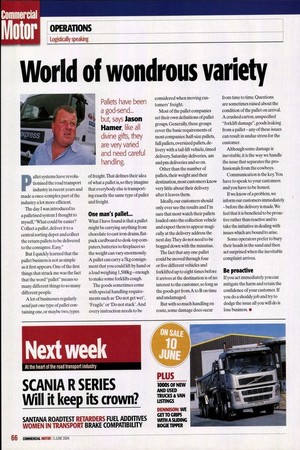World of wondrous variety
Page 66

If you've noticed an error in this article please click here to report it so we can fix it.
pallet systems have revolutionised the road transport industry in recent years and made a once-complex part of the industry a lot more efficient.
pallet systems have revolutionised the road transport industry in recent years and made a once-complex part of the industry a lot more efficient.
pallet systems have revolutionised the road transport industry in recent years and made a once-complex part of the industry a lot more efficient.
The day I was introduced to a palletised system I thought to myself,"What could be easier? Collect a pallet, deliver it to a central sorting depot and collect the return pallets to be delivered to the consignee. Easy."
But I quickly learned that the pallet business is not as simple as it first appears. One of the first things that struck me was the fact that the word "pallet" means so many different things to so many different people. A lot of businesses regularly send just one type of pallet containing one, or maybe two, types
of freight. That defines their idea of what a pallet is, so they imagine that everybody else is transporting exactly the same type of pallet and freight.
One man's pallet...
What! have found is that a pallet might be carrying anything from chocolate to cast iron drains, flatpack cardboard to desk-top computers, batteries to fireplaces so the weight can vary enormously. A pallet can carry a 5kg consignment that you could lift by hand or a load weighing 1,500kg — enough to make some forklifts cough.
What! have found is that a pallet might be carrying anything from chocolate to cast iron drains, flatpack cardboard to desk-top computers, batteries to fireplaces so the weight can vary enormously. A pallet can carry a 5kg consignment that you could lift by hand or a load weighing 1,500kg — enough to make some forklifts cough. The goods sometimes come with special handling requirements such as 'Do not get wet', 'Fragile' or 'Do not stack'.And every instruction needs to be
considered when moving customers' freight.
Most of the pallet companies set their own definitions of pallet groups. Generally, these groups cover the basic requirements of most companies: half-size pallets, full pallets, oversized pallets, delivery with a tail-lift vehicle, timed delivery, Saturday deliveries, am and pm deliveries and so on.
Other than the number of pallets, their weight and their destination, most customers know very little about their delivery after it leaves them.
Ideally, our customers should only ever see the results and I'm sure that most watch their pallets loaded onto the collection vehicle and expect them to appear magically at the delivery address the next day.They do not need to be bogged down with the minutiae.
The fact that any one pallet could be moved through four or five different vehicles and forldifted up to eight times before it arrives at the destination is of no interest to the customer, so long as the goods get from A to B on time and undamaged. But with so much handling en route, some damage does occur
from time to time. Questions are sometimes raised about the condition of the pallet on arrival. A crushed carton, unspecified "forklift damage", goods leaking from a pallet — any of these issues can result in undue stress for the customer.
Although some damage is inevitable, it is the way we handle the issue that separates the professionals from the cowboys.
Communication is the key.You have to speak to your customers and you have to be honest.
If we know of a problem, we inform our customers immediately —before the delivery is made.We feel that it is beneficial to be proactive rather than reactive and to take the initiative in dealing with issues which are bound to arise.
Some operators prefer to bury their heads in the sand and then act surprised when the inevitable complaint arrives.
Be proactive
Be proactive If you act immediately you can mitigate the harm and retain the confidence of your customer. If you do a shoddy job and try to dodge the issue all you will do is lose business. •
































































































































































































